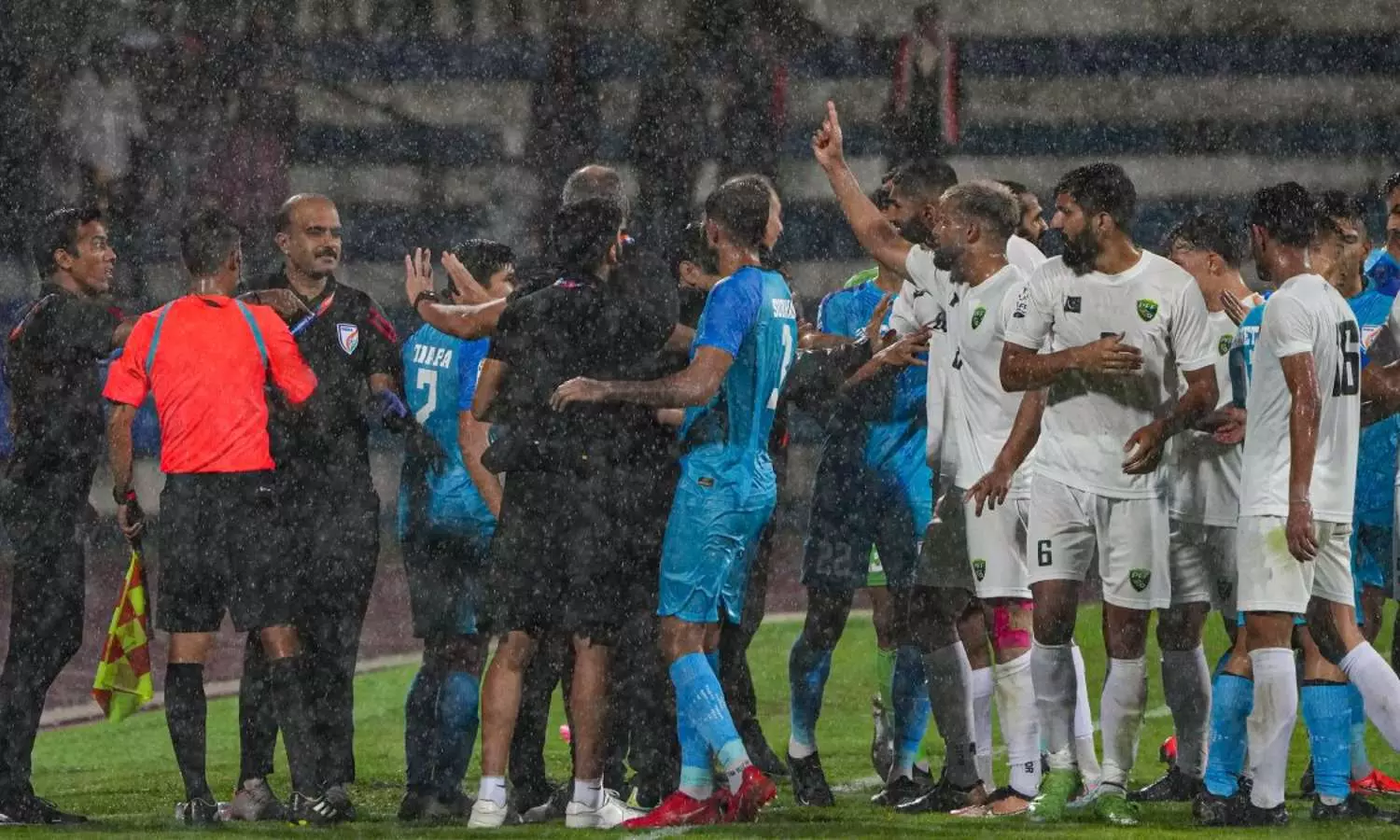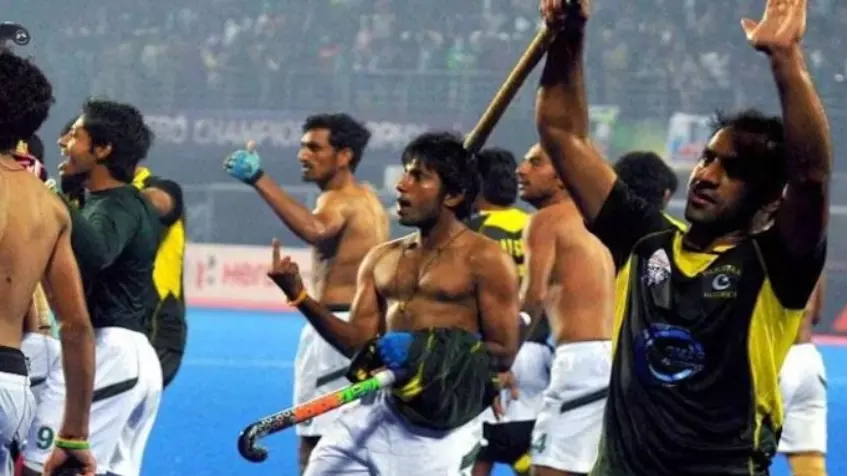Hockey
India-Pakistan sporting rivalry: When lines of battle were crossed on the pitch
Igor Stimac was in the middle of an India-Pakistan scuffle in the SAFF Championship. Here are some other instances when tempers have flared when India and Pakistan faced off in hockey, kabaddi, squash.

Igor Stimac was in the middle of a scuffle between India and Pakistan players at the SAFF Championship. (AIFF)
Time stands still when India Pakistan faces off on the playing field. It’s not a mere sporting rivalry. Sport becomes a blood-sport, with a nation’s prestige on the line. The culture, history and ‘idea of a nation’ has shaped the rivalry and escalated it into a hyper-volatile and hyper-nationalistic spectacle.
The recent brawl between India and Pakistan involving India's head coach, Igor Stimac, at the 2023 SAFF Championship was a blunt reminder of exactly how fierce the mother of all rivalries can be. People are familiar with the infamous on-field spats involving cricketers such as Gautam Gambhir and Kamran Akmal in 2010 or Venkatesh Prasad and Aamer Sohail at the 1996 Cricket World Cup. But there have been a few similar instances beyond cricket.
HOCKEY
The Partition may have been 75 years ago but the India-Pakistan hockey rivalry mirrors the international relations between the two and sometimes highlights the prevalent partitioned minds.
As Indian hockey legend Balbir Singh Sr. stated, “Niaz Khan, A.I.S. Dara, Shah Rukh, Mehmood and Aziz saw us [at the 1948 London Olympics], but I was surprised to see that our old friends were deliberately keeping a distance from us. The openness of old was gone.” Thus, setting the foundational pillars of the ever-so hyper-nationalistic hockey rivalry.
Elation leads to Obscenity - 2014
It was the 2014 Champions Trophy semi-final. India and Pakistan were tied at 3-3 in a high-voltage match. With less than two minutes left, Pakistan’s Arslan Qadir scored a last-minute winner to make it 4-3 and shatter Indian hearts. With adrenaline still running high and as Pakistan stumbled into elation, the Pakistani hockey athletes proceeded to make obscene gestured at the crowd. The players took off their jerseys and flashed their middle fingers at the Indian fans at the Kalinga Stadium in Bhubaneswar.

The Pakistan hockey team celebrates following their 2014 Champions Trophy semi-final triumph over India.
The Indian men’s hockey team was left enraged. Soon-after, Muhammad Tousiq and Ali Ajmad were suspended by the International Hockey Federation (FIH) and few others were let off with stern warnings. Consequently, India decided against playing any bilateral series against Pakistan unless the Pakistan Hockey Federation (PHF) issued a formal unconditional apology. That apology never arrived.
The coarse and unacceptable incident additionally led to Pakistan hockey players being prohibited from participating in the Hockey India League. The then Indian hockey team captain Sardar Singh backed the decision. He stated, “Pakistani players are suffering a lot but what they did during the 2014 Champions Trophy was unacceptable. They still haven’t apologised for their behaviour so I feel they shouldn’t be allowed (to participate in HIL).”
The PHF allege that in 2016, in an act of revenge, Hockey India intentionally refused to grant visas in time for the 2016 Junior Hockey World Cup in Lucknow.
Gurbaj Singh left in stitches - 2011
At the tri-nation hockey tournament in Australia in 2011, India secured a comfortable 3-0 lead at half-time. Pakistan turned the game on its head with back-to-back goals by Sohail Abbas and the finishing blow was delivered by Pakistan’s captain, Shakeel Abbasi. Soon-after, tempers were running high. India’s Gurbaj Singh was involved in an altercation with the Pakistani players Syed Imran Shah and Shafqat Rasool and the altercation escalated to a physically violent one, laden with flying punches and hockey sticks. Furthermore, Pakistani team manager Khawaja alleged that Pakistani hockey player Mohammad Imran, was additionally attacked by a spectator.
As a result of the volatile skirmish, Shah and Rasool picked up injuries and Gurbaj Singh left with two stitches. The match eventually was abandoned and not resumed. Singh was banned for three matches.
India’s Gurvinder Singh Chandi and assistant coach Jugraj Singh were additionally handed five-match bans. Whereas Tushar Khandker and the team's physiologist David John, who was the stand-in manager for the game, were handed a one-match ban along with Pakistan skipper, Shakeel Abbas.
Post-judgement, the Indian team alleged bias in the decision-making, re-iterating how it was the Pakistani team that was the instigator for the brawl. An HI official stated, “It started as usual with their players using abusive language and taunting our players. Attempts were also made to injure our players. Our players retaliated and soon things got out of hands.”
A World Cup to remember…for all the wrong reasons - 1990
When we talk about tempers flaring on the pitch, it is not always limited to the players. The India men hockey team’s experiences at the 1990 Hockey World Cup at Lahore exemplifies this.
During their matches in front of an avid Lahore crowd, bottles, bricks, slippers, and other objects alike were hurled at the Indian team during their match. The Indian team had no option but to walk off and were offered the option to abandon the game.

The Olive Branch end of the duality of the Mother of All Rivalries. The Indian football team is greeted with rose petals in Lahore to play three matches in the first ever football series between India-Pakistan in 2005. In contrast to Lahore's reception, 15 years prior. [Picture Credit: Getty Images, Arif Ali]
But coach MP Ganesh refused to let his boys take the easy way out. Amidst a turbulent Lahore crowd, play continued. But the conditions were extremely hostile and psychological warfare ensued. Despite the hospitality of Pakistan authorities and the Pakistani hockey team, the Indian team weren't allowed to leave their hotel or practice due to the turbulent atmosphere. India finished last in the group stages, securing only one draw.
Former Indian hockey player Pargat Singh and then captain stated, “The incidents of stone-throwing at us, even inside the stadium, demoralised the team. The atmosphere was terrible and obviously hockey was not the priority for those who came to watch our matches. They clearly had an agenda to disturb us and they did succeed in their designs.” Other Indian players such as Dhanraj Pillay branded 1990 Lahore as the most bitter experience in their career.
KABADDI
The India-Pakistan incident at the 2012 Asia Kabaddi Cup held at Lahore, bore similar traits as that of the recent brawl at the SAFF Championship. Both incidents involved the coach of the Indian team halting the flow of play, alleging unfair calls by the officials.
In a nail-biting and neck-to-neck final, the Indian team felt that the official’s calls were consistently going against them. The Pakistan team simultaneously argued that the Indian team’s Sukhdev Singh was guilty of violating the rules of the game by attempting to attack their area two times in a row.
As frustration mounted, Indian team coach Goormel Singh halted up play by repeatedly entering the Kabaddi circle, to challenge the decision-making of the officials. The Pakistan team started to protest against Goormel’s repeated interferences and heated arguments ensued. To make matters worse, Goormel was shown a green card by the referee for his ‘constant interference in field matters.’
This was the last straw for the Indian team. With six minutes left on the clock, they walked out in protest of the green card and the ‘unfair’ officiating that preceded it. The Kabaddi Federation arrived at the consensus that India had forfeited the match. With the score-line of 40-31, Pakistan celebrated in front of their home crowd and were declared champions of the Asia Kabaddi Cup for the very first time.
SQUASH
It was a semi-final encounter between India’s Harinder Pal Sandhu and Pakistan’s Nasir Iqbal at the 2016 South Asian Games. The high-stake match was physical from the very outset.
In the early moments of the match, Sandhu bruised his lips when his chin brushed against Iqbal’s shoulder. Soon-after, Sandhu thumped into Iqbal’s back, causing the referee to declare ‘excessive contact’ between the duo. Sandhu was vocal in questioning the referee’s decisions throughout the course of the match.
Sandhu and Iqbal didn’t leave out anything within the glass doors of the squash court. Each point was fought with blood, sweat and, adrenaline with the crowd rallying on the athletes. The referee stated that the athletes were ‘getting physical too early’ and had to interfere to try and calm them down.
The match was going down to the wire but amidst the fourth game, Sandhu pulled his hamstring. Iqbal and the Pakistan team initially objected to any medical treatment for Sandhu, stating that it was a time-wasting tactic. But Sandhu could not continue any further. He shook Iqbal’s hand and the match ended abruptly with the scoreline of 7-11, 14-12, 7-11 and 6-6 (6-11).
